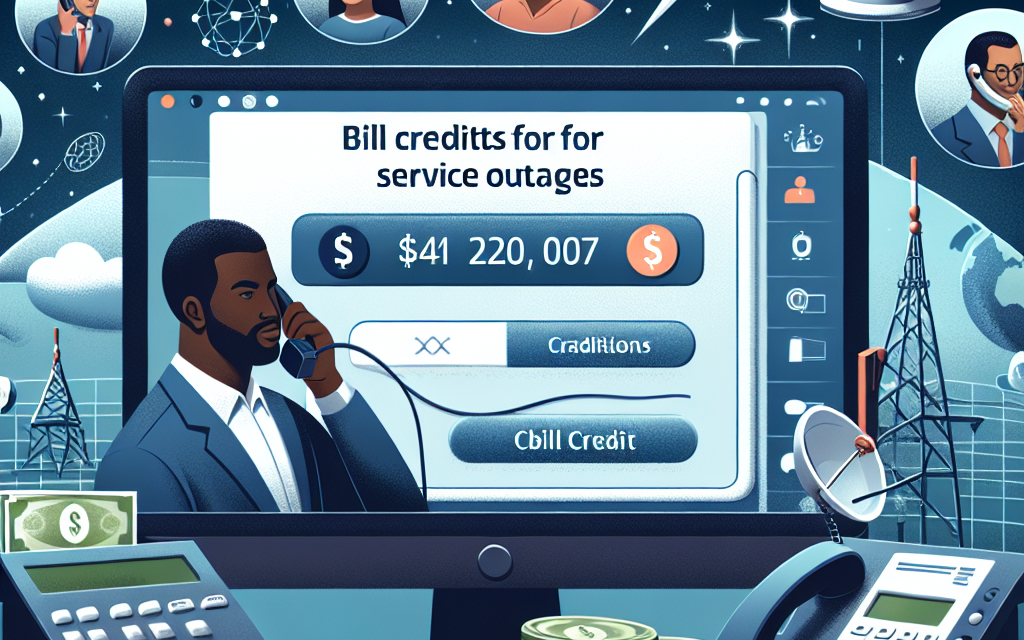“AT&T: Connecting You with Care – Bill Credits for Service Outages.”
Introduction
AT&T has announced a new initiative to provide bill credits to customers affected by service outages, demonstrating its commitment to customer satisfaction and accountability. This program aims to compensate users for disruptions in service, ensuring that they receive fair treatment during unforeseen circumstances. By implementing this policy, AT&T seeks to enhance customer trust and loyalty, reinforcing its dedication to delivering reliable communication services.
AT&T’s Commitment to Customer Satisfaction
AT&T has long been recognized as a leading telecommunications provider, and its commitment to customer satisfaction remains a cornerstone of its business philosophy. In an era where connectivity is paramount, the company understands that service reliability is not just a luxury but a necessity for its customers. Recently, AT&T has taken significant steps to reinforce this commitment by announcing a new initiative aimed at compensating customers for service outages through bill credits. This proactive approach not only addresses customer concerns but also reflects the company’s dedication to maintaining trust and transparency in its operations.
The decision to offer bill credits in the event of service disruptions is a clear acknowledgment of the impact that such outages can have on customers’ daily lives. Whether it is for personal communication, remote work, or essential services, uninterrupted connectivity is crucial. By implementing this compensation policy, AT&T is not merely responding to customer grievances; it is actively working to enhance the overall customer experience. This initiative serves as a testament to the company’s understanding of the challenges faced by its users and its willingness to take responsibility when service levels fall short.
Moreover, this move aligns with broader industry trends where customer-centric policies are becoming increasingly important. In a competitive market, telecommunications companies are vying for customer loyalty, and AT&T’s decision to provide bill credits positions it favorably among its peers. By prioritizing customer satisfaction in this manner, AT&T is not only addressing immediate concerns but also fostering long-term relationships with its clientele. This strategy is likely to resonate well with customers who value accountability and responsiveness from their service providers.
In addition to the financial compensation, AT&T’s initiative underscores the importance of communication during service outages. The company has committed to keeping customers informed about the status of their services, which is a critical aspect of managing expectations. By providing timely updates and transparent information regarding outages, AT&T demonstrates its commitment to customer engagement. This level of communication can significantly alleviate frustration during service interruptions, as customers feel more connected and informed about the situation.
Furthermore, AT&T’s approach to customer satisfaction extends beyond just addressing outages. The company continuously invests in infrastructure improvements and technological advancements to enhance service reliability. By upgrading its network and expanding coverage, AT&T aims to minimize the occurrence of outages in the first place. This proactive investment in technology not only benefits current customers but also attracts new users who seek dependable service.
In conclusion, AT&T’s decision to provide bill credits for service outages is a significant step in reinforcing its commitment to customer satisfaction. By acknowledging the challenges faced by its customers and taking responsibility for service disruptions, the company is fostering trust and loyalty. This initiative, coupled with ongoing investments in infrastructure and a focus on transparent communication, positions AT&T as a leader in customer-centric practices within the telecommunications industry. As the company continues to evolve and adapt to the needs of its customers, it is clear that AT&T remains dedicated to ensuring that its users receive the reliable service they deserve. Through these efforts, AT&T not only enhances its reputation but also sets a standard for customer service excellence in the telecommunications sector.
Understanding Bill Credits for Service Outages
In recent developments, AT&T has announced a new initiative aimed at addressing customer dissatisfaction stemming from service outages. This initiative involves providing bill credits to customers affected by these disruptions, a move that underscores the company’s commitment to customer service and accountability. Understanding the mechanics of bill credits for service outages is essential for customers who may find themselves in situations where their service is interrupted.
Bill credits serve as a form of compensation for customers who experience service outages, which can occur for various reasons, including technical failures, natural disasters, or maintenance activities. When a service interruption occurs, it can lead to significant inconvenience, particularly for those who rely on their telecommunications services for work, communication, and entertainment. Recognizing this, AT&T’s decision to offer bill credits is a proactive approach to mitigate the impact of such outages on its customer base.
To qualify for these bill credits, customers must first report the service outage to AT&T. This process typically involves contacting customer service through various channels, such as phone, online chat, or the company’s mobile app. Once the outage is reported, AT&T will assess the situation and determine the duration of the service disruption. The length of the outage is a critical factor in calculating the amount of the bill credit. Generally, the longer the service is unavailable, the higher the credit that may be applied to the customer’s account.
Moreover, it is important for customers to understand the specific terms and conditions associated with these bill credits. AT&T has established guidelines that outline eligibility criteria, including the necessity for customers to be in good standing with their accounts. This means that customers must have an active service plan and should not have any outstanding balances that could affect their eligibility for credits. By setting these parameters, AT&T aims to ensure that the compensation process is fair and equitable for all customers.
In addition to providing financial relief, the introduction of bill credits for service outages reflects AT&T’s broader strategy to enhance customer satisfaction and loyalty. By acknowledging the inconvenience caused by service interruptions and taking tangible steps to address it, the company is fostering a sense of trust and reliability among its users. This initiative not only helps to alleviate immediate concerns but also reinforces AT&T’s reputation as a customer-centric organization.
Furthermore, customers should be aware that the process of receiving bill credits may take some time. After the outage has been reported and verified, the credit will typically be applied to the customer’s next billing cycle. This timeline can vary based on the complexity of the outage and the volume of claims being processed. Therefore, it is advisable for customers to monitor their accounts closely to ensure that the credits are accurately reflected in their billing statements.
In conclusion, AT&T’s decision to provide bill credits for service outages represents a significant step towards enhancing customer experience and accountability. By understanding the process and criteria for receiving these credits, customers can better navigate the challenges posed by service interruptions. Ultimately, this initiative not only serves to compensate customers for their inconvenience but also reinforces AT&T’s commitment to maintaining a high standard of service in an increasingly competitive telecommunications landscape.
How to Request Bill Credits from AT&T
In light of recent service outages, AT&T has announced a new initiative to provide bill credits to affected customers as a means of compensation. This decision reflects the company’s commitment to customer satisfaction and its recognition of the inconvenience that service disruptions can cause. For customers seeking to request these bill credits, the process is straightforward, ensuring that those impacted can receive the compensation they deserve without undue hassle.
To begin the process of requesting bill credits, customers should first gather relevant information regarding their account and the specific service outage they experienced. This includes details such as the account number, the dates and times of the service disruption, and any communication received from AT&T regarding the outage. Having this information readily available will facilitate a smoother interaction with customer service representatives.
Once the necessary information is compiled, customers can initiate their request through several channels. One of the most efficient methods is to contact AT&T’s customer service directly via phone. By calling the designated customer service number, customers can speak with a representative who is trained to handle billing inquiries and service issues. During the call, it is advisable to clearly explain the situation, including the duration of the outage and any inconveniences faced. The representative will then guide the customer through the process of applying for the bill credit.
Alternatively, customers may choose to utilize AT&T’s online platform to submit their request. By logging into their account on the AT&T website or mobile app, customers can access the billing section where they may find options related to service outages. This digital approach not only allows for a convenient submission of requests but also provides a record of the inquiry for future reference. Additionally, customers can explore the FAQ section on the website, which may offer insights into common issues and the corresponding compensation policies.
For those who prefer written communication, sending a formal request via email or traditional mail is also an option. In this case, it is important to include all pertinent details, such as the account number, a description of the outage, and a request for the bill credit. This method may take longer to process, but it ensures that there is a documented request on file.
After submitting the request, customers should monitor their account statements closely. AT&T typically processes bill credits within one to two billing cycles, depending on the volume of requests and the specifics of each case. If a customer does not see the expected credit applied to their account within this timeframe, it is advisable to follow up with customer service to ensure that the request was received and is being processed.
In conclusion, AT&T’s initiative to provide bill credits for service outages is a commendable step towards enhancing customer satisfaction. By following the outlined steps to request these credits, customers can navigate the process with ease. Whether through phone, online, or written communication, AT&T aims to address customer concerns promptly and effectively, reinforcing its commitment to service reliability and customer care.
The Impact of Service Outages on Customers
Service outages can significantly disrupt the daily lives of customers who rely on telecommunications services for both personal and professional communication. When these outages occur, they can lead to a cascade of inconveniences, affecting everything from basic connectivity to critical business operations. For many individuals and businesses, uninterrupted service is not just a convenience; it is a necessity. Therefore, when outages happen, the repercussions can be far-reaching, leading to frustration and dissatisfaction among users.
The impact of service outages extends beyond mere inconvenience. For businesses, especially those that depend heavily on reliable communication channels, an outage can result in lost revenue and diminished productivity. Employees may find themselves unable to communicate with clients or colleagues, leading to delays in project timelines and potential loss of contracts. Furthermore, the inability to access essential services can hinder customer support operations, leaving clients without the assistance they need. This can erode trust and loyalty, which are vital for maintaining a competitive edge in the market.
Moreover, for individual customers, service outages can disrupt daily routines and essential activities. Many people rely on their mobile devices for everything from social interaction to accessing information and services. When these devices fail to connect, it can lead to feelings of isolation and frustration. In an increasingly digital world, where communication often occurs through online platforms, the inability to connect can feel particularly acute. This is especially true during emergencies when individuals may need to reach out for help or information.
Recognizing the significant impact of service outages, AT&T has taken steps to address customer concerns by offering bill credits as compensation for these disruptions. This initiative reflects an understanding of the challenges faced by customers during service interruptions and aims to mitigate some of the negative effects associated with such events. By providing financial compensation, AT&T not only acknowledges the inconvenience caused by outages but also reinforces its commitment to customer satisfaction.
Furthermore, this approach serves to enhance customer loyalty. When customers feel that their concerns are being addressed and that their service provider is taking responsibility for outages, they are more likely to remain loyal to that provider. In a competitive telecommunications market, where customers have numerous options, demonstrating accountability can be a key differentiator. By offering bill credits, AT&T is not only compensating customers for their inconvenience but also fostering a sense of trust and reliability.
In addition to financial compensation, it is essential for service providers to communicate effectively with their customers during outages. Transparency regarding the cause of the outage, estimated resolution times, and ongoing efforts to restore service can help alleviate customer frustration. When customers are kept informed, they are more likely to feel valued and understood, which can mitigate some of the negative feelings associated with service disruptions.
In conclusion, service outages can have a profound impact on both individual customers and businesses, leading to frustration and potential financial loss. AT&T’s decision to provide bill credits as compensation reflects a proactive approach to addressing these challenges. By acknowledging the inconvenience caused by outages and taking steps to compensate affected customers, AT&T not only enhances customer satisfaction but also strengthens its reputation in a competitive market. Ultimately, effective communication and accountability are crucial in maintaining customer trust and loyalty in the face of service disruptions.
AT&T’s Policies on Service Disruptions
In recent developments, AT&T has announced a new policy aimed at addressing customer concerns regarding service disruptions. This initiative reflects the company’s commitment to customer satisfaction and acknowledges the inconvenience that service outages can cause. By providing bill credits to affected customers, AT&T is taking a proactive approach to mitigate the impact of these disruptions, thereby reinforcing its dedication to maintaining a reliable service.
Service disruptions can occur for a variety of reasons, including severe weather events, technical malfunctions, or infrastructure upgrades. Recognizing that these interruptions can significantly affect customers’ daily lives, AT&T has implemented a structured response to ensure that its customers feel valued and compensated for their inconveniences. The decision to offer bill credits is a strategic move that not only addresses immediate customer grievances but also aims to enhance overall customer loyalty in the long term.
To qualify for these bill credits, customers must meet specific criteria related to the duration and nature of the service outage. AT&T has established clear guidelines that outline the circumstances under which credits will be issued. This transparency is crucial, as it allows customers to understand the process and the conditions that must be met to receive compensation. By doing so, AT&T is fostering a sense of trust and reliability, which is essential in the competitive telecommunications market.
Moreover, the implementation of this policy is indicative of a broader trend within the telecommunications industry, where companies are increasingly recognizing the importance of customer service and satisfaction. As consumers become more discerning and demand higher levels of accountability from service providers, AT&T’s initiative positions the company as a leader in customer care. This proactive stance not only helps to alleviate customer frustration during outages but also sets a precedent for other companies in the industry to follow.
In addition to providing bill credits, AT&T is also enhancing its communication strategies during service disruptions. The company is committed to keeping customers informed about the status of outages and the expected timeline for resolution. By utilizing various communication channels, including text alerts and social media updates, AT&T aims to ensure that customers are not left in the dark during service interruptions. This level of transparency is vital in maintaining customer trust and demonstrates AT&T’s commitment to providing a high standard of service.
Furthermore, AT&T’s approach to service disruptions aligns with its broader corporate responsibility goals. By prioritizing customer satisfaction and addressing service issues promptly, the company is not only enhancing its reputation but also contributing to a more positive customer experience. This focus on accountability and responsiveness is essential in an era where consumers have numerous options for telecommunications services.
In conclusion, AT&T’s decision to provide bill credits for service outages is a significant step towards improving customer relations and addressing the challenges posed by service disruptions. By establishing clear policies and enhancing communication, the company is demonstrating its commitment to customer satisfaction. As AT&T continues to navigate the complexities of the telecommunications landscape, its proactive measures will likely play a crucial role in fostering customer loyalty and maintaining a competitive edge in the industry. Ultimately, this initiative reflects a growing recognition of the importance of customer care in today’s fast-paced digital world.
Customer Experiences with AT&T Bill Credits
In recent developments, AT&T has announced a new initiative aimed at addressing customer dissatisfaction stemming from service outages. This decision to provide bill credits is a significant step towards enhancing customer experiences and demonstrating the company’s commitment to accountability. As service interruptions can lead to considerable inconvenience, particularly in an era where connectivity is paramount, AT&T’s move is likely to resonate positively with its customer base.
Customers have long expressed frustration when faced with unexpected service disruptions, which can affect everything from personal communications to business operations. In light of this, AT&T’s decision to offer bill credits serves as a tangible acknowledgment of the challenges that outages can impose. By compensating customers for the periods during which they were unable to access services, AT&T not only seeks to alleviate some of the financial burdens associated with these interruptions but also aims to rebuild trust and foster loyalty among its users.
Moreover, the implementation of bill credits is expected to streamline the customer service experience. Traditionally, customers have had to navigate complex processes to seek compensation for service issues, often resulting in prolonged wait times and frustration. With the new policy, AT&T is simplifying this process, allowing customers to receive credits automatically based on the duration of the outage. This proactive approach not only enhances customer satisfaction but also reflects a broader trend in the telecommunications industry towards more customer-centric practices.
In addition to the immediate financial relief that bill credits provide, they also serve as a form of reassurance for customers. Knowing that their service provider is willing to take responsibility for outages can significantly improve customer perceptions of the company. This is particularly important in a competitive market where consumers have numerous options for telecommunications services. By prioritizing customer experiences and addressing service reliability, AT&T positions itself as a more attractive choice for both current and prospective customers.
Furthermore, the introduction of bill credits aligns with AT&T’s broader strategy of improving service quality and reliability. The company has invested heavily in infrastructure upgrades and technological advancements to minimize the occurrence of outages. By coupling these improvements with a clear compensation policy, AT&T is not only addressing past shortcomings but also signaling its commitment to future service excellence. This dual approach can enhance customer confidence in the brand, as users are more likely to remain loyal to a provider that actively works to improve its services while also taking responsibility for any lapses.
As customers begin to experience the benefits of this new policy, it is anticipated that positive word-of-mouth will further bolster AT&T’s reputation. Satisfied customers are more likely to share their experiences with friends and family, potentially attracting new users to the service. In this way, the bill credit initiative could have far-reaching implications for customer acquisition and retention.
In conclusion, AT&T’s decision to provide bill credits for service outages represents a significant shift towards a more customer-focused approach. By acknowledging the impact of service interruptions and offering compensation, the company not only addresses immediate concerns but also lays the groundwork for improved customer relationships in the long term. As AT&T continues to enhance its services and prioritize customer satisfaction, it is poised to strengthen its position in the competitive telecommunications landscape.
Future Improvements in AT&T’s Service Reliability
In recent years, service reliability has become a critical concern for telecommunications companies, and AT&T is no exception. As the company navigates the complexities of modern communication demands, it recognizes the importance of enhancing its service reliability to meet customer expectations. This commitment is underscored by AT&T’s recent decision to provide bill credits for service outages, a move that not only compensates customers for their inconvenience but also signals a broader initiative to improve overall service quality.
To begin with, AT&T’s acknowledgment of service outages as a significant issue reflects a growing awareness of customer needs in an increasingly digital world. With more people relying on their mobile devices and internet services for both personal and professional use, any disruption can lead to frustration and lost productivity. By offering bill credits, AT&T is taking a proactive approach to address these concerns, demonstrating that it values customer loyalty and satisfaction. This initiative is not merely a financial gesture; it is part of a larger strategy aimed at fostering trust and transparency between the company and its customers.
Moreover, AT&T is investing in infrastructure upgrades to bolster its network reliability. These enhancements are essential for accommodating the rising demand for high-speed internet and seamless connectivity. As technology continues to evolve, so too do the expectations of consumers. They seek not only reliable service but also faster speeds and greater capacity. In response, AT&T is focusing on expanding its fiber-optic network, which is known for its superior performance and reliability compared to traditional copper lines. This shift not only aims to reduce the frequency of outages but also enhances the overall user experience, allowing customers to enjoy uninterrupted service.
In addition to infrastructure improvements, AT&T is also prioritizing customer service training for its employees. A well-informed and responsive customer service team can significantly mitigate the impact of service outages. By equipping representatives with the tools and knowledge necessary to assist customers effectively, AT&T aims to ensure that any issues are addressed promptly and efficiently. This focus on customer service is crucial, as it helps to build a positive relationship with users, reinforcing the company’s commitment to reliability and support.
Furthermore, AT&T is exploring advanced technologies such as artificial intelligence and machine learning to predict and prevent service disruptions. By analyzing data patterns and network performance metrics, the company can identify potential issues before they escalate into widespread outages. This proactive approach not only minimizes downtime but also enhances the overall resilience of the network. As AT&T continues to innovate and adapt to the changing landscape of telecommunications, these technological advancements will play a pivotal role in ensuring that customers receive the reliable service they expect.
In conclusion, AT&T’s decision to provide bill credits for service outages is a clear indication of its commitment to improving service reliability. By investing in infrastructure, enhancing customer service, and leveraging advanced technologies, the company is taking significant steps toward creating a more dependable communication experience for its customers. As AT&T moves forward, it is poised to not only meet but exceed the expectations of its users, ultimately fostering a stronger, more resilient network that can withstand the challenges of the future. Through these efforts, AT&T aims to solidify its position as a leader in the telecommunications industry, dedicated to delivering exceptional service and support to its valued customers.
Q&A
1. **Question:** What is the reason AT&T is providing bill credits to customers?
**Answer:** AT&T is providing bill credits to compensate customers for service outages.
2. **Question:** How will customers be notified about the bill credits?
**Answer:** Customers will be notified via email or through their online account.
3. **Question:** What types of service outages qualify for bill credits?
**Answer:** Bill credits are typically provided for significant service outages that affect voice, internet, or TV services.
4. **Question:** How much credit can customers expect to receive?
**Answer:** The amount of credit varies based on the duration of the outage and the specific service affected.
5. **Question:** Do customers need to take any action to receive the bill credits?
**Answer:** No, customers do not need to take any action; credits will be automatically applied to their accounts.
6. **Question:** Will the bill credits appear on the next billing statement?
**Answer:** Yes, the bill credits will generally appear on the next billing statement after the outage.
7. **Question:** Is there a limit to how many times customers can receive bill credits for outages?
**Answer:** There may be limits based on the terms of service, but significant and repeated outages are typically considered for credits.
Conclusion
AT&T’s decision to provide bill credits for service outages reflects a commitment to customer satisfaction and accountability. By compensating customers for disruptions, the company acknowledges the impact of service reliability on user experience and aims to strengthen customer trust and loyalty. This proactive approach not only addresses immediate concerns but also positions AT&T as a responsive service provider in a competitive telecommunications market.





